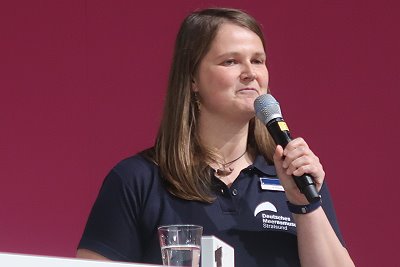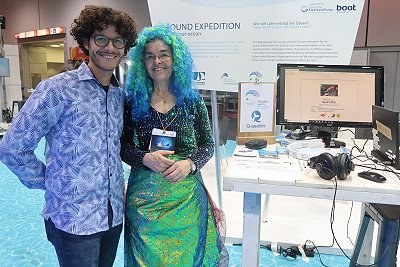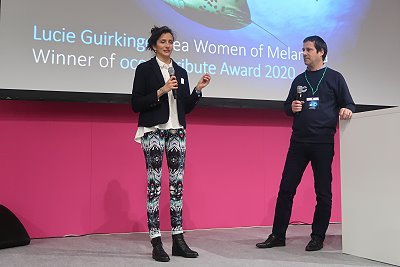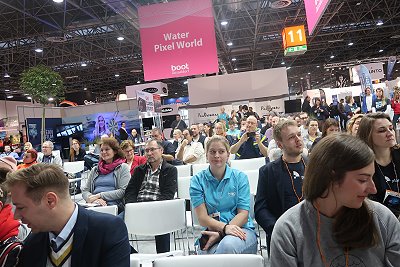 It's the fourth time that the BOOT fair in Düsseldorf hosts the "love your ocean" platform of conservation organisations and innovators coordinated by the German Marine Foundation. It's the second time that Mundus maris and Q-quatics participate reaching out to visitors of all ages to discover the sounds fish are making and how to protect the ocean in times of growing demands on its resources.
It's the fourth time that the BOOT fair in Düsseldorf hosts the "love your ocean" platform of conservation organisations and innovators coordinated by the German Marine Foundation. It's the second time that Mundus maris and Q-quatics participate reaching out to visitors of all ages to discover the sounds fish are making and how to protect the ocean in times of growing demands on its resources.
The sound expedition part of the platform allowed visitors to discover that "silent as a fish" is certainly not true for the family of grunts and many more species. Pupils and adults alike were often surprised to learn that even a common fish like Atlantic cod, believed to be tacit, makes clicking sounds when escaping danger. There was never enough time for everybody of the school classes arriving in tidal waves at the love your ocean space to get enough trials for ldentifying the species in the quiz which make the sounds. Luckily, the fish sound quiz is freely available at the FishBase.org website and can be played with even more options on the internet from home, though Neptun and mermaid like at the fair will not be there to give further explanations.
 Sounds of marine mammals enchanted many visitors. To think that their social chatter would be disturbed and destroyed by unbearably strong explosions from oil and gas explorations saddened them.
Sounds of marine mammals enchanted many visitors. To think that their social chatter would be disturbed and destroyed by unbearably strong explosions from oil and gas explorations saddened them.
The demonstration that shipping and other man-made noise was now so loud in many parts of the ocean so as to overwhelm the naturally occurring sounds of waves, calving icebergs and sounds made by animals came as a surprise to the majority even of those already in touch with water sports or angling or otherwise interested in the ocean.
Many conversations moved on to other amazing ocean creatures and how they are affected by overfishing, climate change and different forms of pollution. The coverage of ocean themes in tv, radio and other media has certainly contributed to improving ocean literacy and the interest to take more action for its protection.
The Mundus maris team was able to reinforce this with lots of information and examples of what is already being done and what else needs doing. A press release drew attention to key messages beforehand.
 Prof. Chris Bridges and some of his students reinforced the team again and were able to share some results from their work on tuna reproduction and invasive species and contributed to the interesting conversations.
Prof. Chris Bridges and some of his students reinforced the team again and were able to share some results from their work on tuna reproduction and invasive species and contributed to the interesting conversations.
The Ocean Forum on Tuesday, 21 January offered entertaining and informative glimpses into a wide range of ocean discovery and protection issues. It was opened by Frank Schweikert of the German Marine Foundation and Petros Michelidakis, the Director of BOOT.
The honour of the first talk was for Lucie Guirkinger, winner of the ocean tribute Award for her work with Sea Women of Melanesia.
Monika Breuch-Moritz, Vice President of the Intergovernmental Oceanographic Commission (IOC) of Unesco, informed about the preparations of the UN Decade for Ocean Science for Sustainable Development (2021-2030).
It is hoped that the implementation programme will establish a good mix between different and complementary approaches, including perspectives from the social sciences to advance in the transitions towards sustainability.
 Cornelia E. Nauen of Mundus maris took the audience on a trip to West Africa's dynamic artisanal fisheries, under siege from high levels of fishing pressure by industrial fleets and the advance of fishmeal production, particularly by Chinese investors, at the expense of domestic and regional human consumption.
Cornelia E. Nauen of Mundus maris took the audience on a trip to West Africa's dynamic artisanal fisheries, under siege from high levels of fishing pressure by industrial fleets and the advance of fishmeal production, particularly by Chinese investors, at the expense of domestic and regional human consumption.
She explained that implementing a policy based on the guidelines for sustainable and prosperous small-scale fisheries (SSF) had potential to establish a more level-playing field with positive effects on food security and social development. Ending the harmful subsidies to industrial and distant water fleeets was urgent to safeguard the economic basis of SSF and their capacity to produce good fish for human consumption.
The SSF academy currently under development in Senegal gave hope that the women and men working along value chains would be able to better defend their livelihoods and play a constructive role in sector governance. The slides are here.
Kim Cornelius Detloff of Naturschutzbund Deutschland (NABU) reminded the audience of the findings and recommendations of recently published global studies by the IPCC and IPBES and underscored the urgency of action to prevent the worst effects of climate change and biodiversity loss.
 Nadine Pankow of the Deutsches Meeresmuseum in Stralsund impressed the audience with real-life sound profiles from different maritime activities, including building off-shore wind parks and maritime traffice. She argued in favour of giving the ocean and ocean life a chance to produce and hear natural sounds and not be drowned out by man-made noise pollution.
Nadine Pankow of the Deutsches Meeresmuseum in Stralsund impressed the audience with real-life sound profiles from different maritime activities, including building off-shore wind parks and maritime traffice. She argued in favour of giving the ocean and ocean life a chance to produce and hear natural sounds and not be drowned out by man-made noise pollution.
Torben Cord of Arkon Shipping took the audience on a whistle stop tour of design and practices in order to innovate the fleets to become rapidly more energy efficient and less noisy. It's to meet the requirement of the Paris Climate Agreement and achieve high levels of service with much less material and energy resources. He showed significant levels of useful innovation with the added advantage of being more cost effective.
BOOT is hearing the voices in the public and civil society organisations and strives to green itself. It offers an amazing mix of experiences, innovations, services and technologies. It is great to be part of these budding changes.
Photos by CE Nauen.
 |
 |
 |
 |








